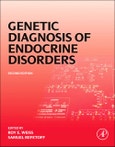Genetic Diagnosis of Endocrine Disorders, Second Edition provides users with a comprehensive reference that is organized by endocrine grouping (i.e., thyroid, pancreas, parathyroid, pituitary, adrenal, and reproductive and bone), discussing the genetic and molecular basis for the diagnosis of various disorders.
The book emphasizes the practical nature of diagnosing a disease, including which tests should be done for the diagnosis of diabetes mellitus in adults and children, which genes should be evaluated for subjects with congenital hypothyroidism, which genetic tests should be ordered in obese patients or for those with parathyroid carcinoma, and the rationale behind testing for multiple endocrine neoplasias.
Please Note: This is an On Demand product, delivery may take up to 11 working days after payment has been received.
Table of Contents
1. Mechanisms of Mutation 2. A Clinical Guide to Monogenic Diabetes 3. Hypoglycemia 4. Functioning Pituitary Adenomas 5. Diabetes Insipidus 6. States of Pituitary Hypofunction 7. Congenital Defects of Thyroid Hormone Synthesis 8. Developmental Abnormalities of the Thyroid 9. Syndromes of Impaired Sensitivity to Thyroid Hormone 10. Molecular Diagnosis of Thyroid Cancer 11. Genetics of Hyperparathyroidism Including Parathyroid Cancer 12. Genetic Diagnosis of Skeletal Dysplasias 13. Vitamin D Disorders 14. Congenital Adrenal Hyperplasia 15. Genetics of Adrenocortical Tumors (ACT)and Hypersecretory Syndromes 16. Hereditary Syndromes Involving Pheochromocytoma and Paraganglioma 17. Genetic Conditions Associated with Congenital Adrenocortical Insufficiency or Glucocorticoid and/or Mineralocorticoid Resistance 18. Genetic Considerations in the Evaluation of Menstrual Cycle Irregularities 19. Disorders of Sex Development 20. Androgen Insensitivity Due to Mutations of the Androgen Receptor 21. Obesity 22. Syndromes of Severe Insulin Resistance and/or Lipodystrophy 23. Lipodystrophies 24. Multiple Endocrine Neoplasia Type 1 (MEN1) 25. Genetics of Polyglandular Failure 26. Genetic Diagnosis of Growth Failure 27. Cost-Effectiveness of Genetic Testing for Monogenic Diabetes 28. Genetic Counseling: The Role of Genetic Counselors on Healthcare Providers and Endocrinology Teams 29. Setting Up a Laboratory 30. Introduction to Applications of Genomic Sequencing








